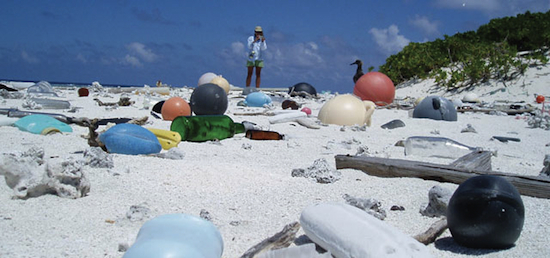By Ashley Verhines
Plastic bag bans are not enough to save the oceans from a growing tide of plastic pollution. Local efforts are crucial, but a concerted global approach is necessary, say the authors of a new report from the UCLA School of Law's Emmett Center on Climate Change and the Environment and UCLA's Institute of the Environment and Sustainability.
The report, "Stemming the Tide of Plastic Marine Litter: A Global Action Agenda," lays out the sources and impacts of marine litter--all human-generated, artificial, often petroleum-based, solid materials that are discarded or lost in the ocean and remain there--and it recommends domestic and global policy recommendations to combat the scourge.
Ultimately, the authors conclude, a global treaty likely will be required to stop the estimated 20 million tons of plastic bags, food packaging, balloons, and other plastic debris that enter the oceans annually. With a 5 percent increase in non-biodegradable plastic production each year, the world's oceans are filling at a rate that is wreaking devastating effects on marine wildlife, coastal economies, fisheries, and human health. Degraded coral reefs, damaged vessels, lost tourism, diminished fishery revenues and other symptoms of plastic-littered marine ecosystems equate to billions of dollars of losses worldwide each year.
Current policies fail to fully address the problem as many of the main sources of the litter fall outside the jurisdiction of any single nation and existing international agreements lack enforceable standards.
"Plastic marine litter is a growing global environmental threat imposing major economic costs on industry and government. Marine plastic pollution slowly degrades and has spread to every corner of the world's oceans from remote islands to the ocean floor. Voluntary half measures are not preventing the global devastating impacts to marine life, the economy and public health," said report coauthor Mark Gold, associate director of UCLA's Institute of the Environment and Sustainability. "Although there is no one panacea, we have identified the top ten plastic pollution prevention actions that can be implemented now to begin drastically reducing plastic marine litter."
"Stemming the Tide of Plastic Marine Litter" reviews the current studies, policies and international agreements surrounding plastic marine litter, and proposes a "Top 10" list of recommended actions--actions the authors recommend implementing by 2025--to dramatically reduce current rates of plastic marine disposal.
Authors of the report call on the global community to develop a new international treaty and amend existing international and regional laws to include more aggressive monitoring and enforcement actions. This would include prompt banning of the most damaging and common types of plastic marine litter. The report also recommends the implementation of an "ocean friendly" certification program for all plastic products, better infrastructure for waste management, development and expansion of marine litter education and awareness, and establishment of funding sources for comprehensive clean-up efforts.
"Because global mismanagement of plastic is fueling the growing marine litter problem, policy responses are needed at all levels, from the international community of nations down to national and local communities," said report coauthor Cara Horowitz, executive director of the Emmett Center on Climate Change and the Environment at UCLA Law School. "We can act now to rapidly scale up effective policies and programs to address plastic marine litter. And hopefully, international collaboration to reduce plastic litter will lay a foundation for broader cooperation on other significant issues affecting the health of our oceans."
"Stemming the Tide of Plastic Marine Litter: A Global Action Agenda" is the most recent Pritzker Environmental Law and Policy Brief, made possible through funding from the charitable Pritzker Group.

